
January-March 2019
Changing Mindset

The mindset is personal, subjective and owned by the person having it and unless and until the person is genuinely convinced to make any changes to it, the results remain stagnant. When a child is born, the parents try their best to teach him in a way that he can be a good-hearted person with a well-behaved nature. The growing years are his years of learning and adapting; however when the child grows up to be a grownup – he/she blooms into a shape that the person prefers to be in; using the person’s own intellect and choices.
The attitude however should always be to stay positive and eager to adapt to new things. The universal truth remains that there is no end to learning and if this statement is understood by an individual, he/she will be able to break through comfort zones and embrace multiple perspectives.
To be professionally pro-active at work, all institutions or organizations will have to stay updated with the developing world and its new practices. In order to do that, individuals who would have to play leading roles would have to consider differing opinions and views of his/her colleagues to produce desirable results. Undoubtedly the shared vision has to be the ultimate point to focus on and for that the leaders would have to aim to act beyond imagination. For that, any failures to reinvent or rigidity to follow business as-usual would bring about adversities to an extreme.
There maybe dis-satisfactions and difficulties when an individual adapts with the changing environments, but unless that can be done success would be temporary and slowly unreachable. Changing the mindset is an integral tool to conquer success and move towards growth and development.
Effective coordination in SBCC activities to reduce duplication and reach out to more people
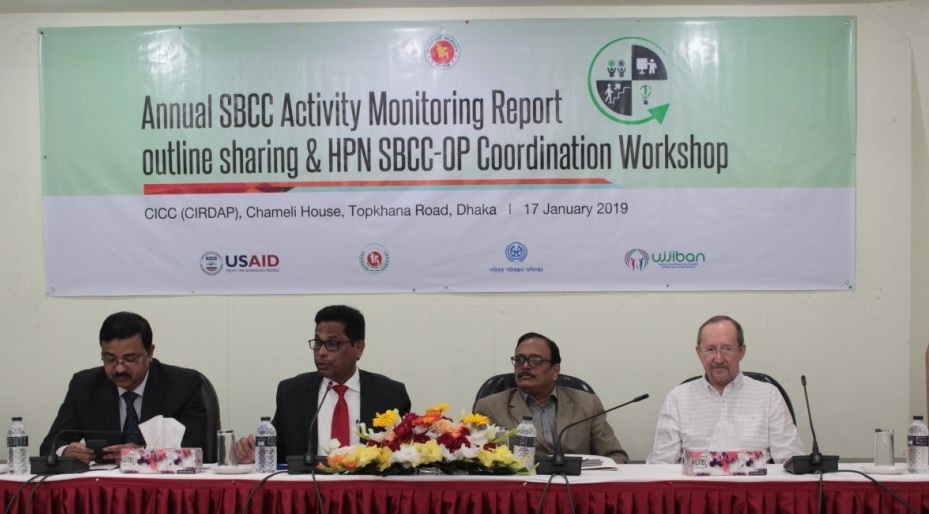
As part of strengthening Ministry of Health and Family Welfare’s (MoHFW) capacity to plan, develop, implement and evaluate more results-based Social & Behavior Change Communication (SBCC), inter-OP Coordination workshop becomes very useful mechanism. Ujjiban is providing TA to this effort and uses a well-planned and systematic approach in which establishing functional coordination within and among different units of Directorate of Health Services (DGHS) and Directorate of Family Planning (DGFP) plays an important role. As part of this, a one-day workshop was held to identify areas for coordination and collaboration so that Operational Plan-based Health, Population and Nutrition (HPN) SBCC activities are cross-pollinated with other relevant components/units of DGHS and DGFP.
The specific objectives were:
- Coordination and collaboration in HPN national level communication campaign; FP Service & Campaign Week, World Health Day, National Nutrition Week, World Population Day
- Uniform use of School Health Curriculum; Univocal HPN information for the school students, using uniform curriculum, coordinated training, dividing working area
- Integrated messaging for uniform and univocal messaging on issues like; Family Planning, Neo Natal Health, IYCF, Non-Communicable Disease Control
- Community Outreach/local level campaign; Health/FP fair, cultural show, street drama, folk talent, AV van
Being invited by the MoHFW, officials from the relevant units under DGHS and DGFP who are actively involved in the development and implementation of SBCC activity of their respective OPs, joined this workshop organized with TA from USAID Ujjiban SBCC Project.
The workshop started with a formal opening session attended by the Additional Secretary (PH&WH), Mr. Md. Habibur Rahman Khan as Chief Guest and Mr. Quazi A.K.M Mohiul Islam, Additional Secretary (Pop. FW & Law) as Special Guest. Mr. Ruhul Amin Talukdar, Joint Secretary (PHWH), MoHFW and Mr. Patrick L Coleman, CoP, Ujjiban were also present in this inaugural session as guest of honor.
In his inaugural speech as Chief Guest Mr. Md. Habibur Rahman Khan put emphasis on effective coordination in SBCC activities to reduce duplication and reach out to more people. He appraised the audience that MoHFW has adopted various interventions including the formation of HPN SBCC Coordination Committees at Directorate, District and Upazila level. While addressing as Special Guest Mr. Quazi A.K.M Mohiul Islam underscored the need of inter-unit coordination in implementation of the OP activities as coordination brings better result for the program. Mr. Ruhul Amin Talukdar opined that the coordination effort will also ensure better coherence even working in the same intervention area and issues. In his speech Mr. Patrick thanked MoHFW for their continuous support in system strengthening effort including inter-unit coordination and expressed happiness as Ujjiban is part of this process by providing technical assistance.
In the first working session of the workshop Dr. Zeenat Sultana, DCoP, Ujjiban provided an overview on the Annual SBCC Activity Monitoring Report as part of outline sharing. This report has accumulated SBCC activities as being implemented by the GoB OPs and NGOs working in the HPN fields, in 12 thematic area and 8 activity domains. Provisional review founds that the IPC is the mostly used channel of communication while mass communication and community media comes after it. The allocation and utilization of resources for certain program issues mostly goes with the MNCH while Family Planning and Adolescent Health follows as next two program issues. In respect to program coverage by geographical locations report founds that except GoBs uniform coverage of HPN interventions throughout Bangladesh the concentration of the focused interventions on certain HPN issues are less in the north and north-west regions in compare to other regions of the country.
Institutionalization of GTF stressed for sustainable public procurement
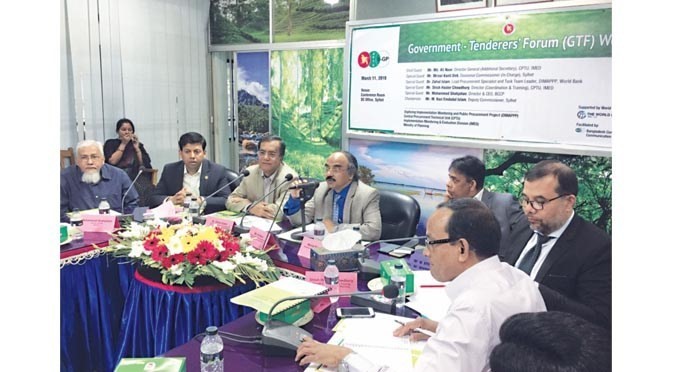
Speakers at a workshop on Government-Tenderers’ Forum (GTF) in Sylhet on March 11, 2019 emphasized on institutionalization of the GTFs at every district in order to make public procurement effective.
GTFs, a platform of procuring entities and tenderers to exchange views, ideas and experiences on procurement including e-GP, would help establish sustainable public procurement system in the country, they said.
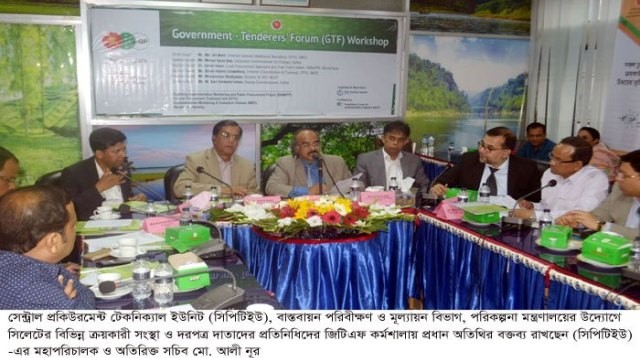
Md Ali Noor, director general of the Central Procurement Technical Unit (CPTU) and Additional Secretary of the Implementation Monitoring and
Evaluation Division (IMED) of Planning Ministry, addressed the workshop as the chief guest at the Deputy Commissioner (DC) office here with the DC M Kazi Emdadul Islam in the chair.
Dr Zafrul Islam, Lead Procurement Specialist and Task Team Leader of the World Bank’s Digitizing Implementation Monitoring and Public Procurement Project (DIMAPPP), Shish Haider Chowdhury, Director (training and coordination) of the IMED’s CPTU, Mohammad Shahjahan, Director and CEO of Bangladesh Centre for Communication Programmes (BCCP) and Mrinal Kanti Deb, Divisional Commissioner (in-charge) of Sylhet spoke as special guests.
Addressing the workshop, Dr Zafrul Islam said, “Bangladesh has proved that procurement reform is possible here. Earlier, there was a gap between the procuring agencies and tenderers. GTF is a unique model in the world where tenderers can sit in a table with government procuring entities.”
Bangladesh is recognized globally for its success in e-GP implementation and many countries are following Bangladesh model, he said, adding, “We would work to make GTF globally prominent so that other countries follow it. For this, GTF needs to be institutionalized”.
Shish Haider Chowdhury stressed on ensuring value for money by ensuring efficiency in spending budget through making development effective.
A central forum of government-tenderers titled Bangladesh Government- Tenderers’ Forum (BGTF) will be formed aiming to ensure full digitization by 2021, he said. Representatives from various procuring entities and a good number of tenderers participated in the workshop organised under DIMAPPP by CPTU and facilitated by BCCP.
A power point presentation was made on GTFs and BGTF at the workshop highlighting the importance of GTF and BGTF and the need for making the forum sustainable through their institutionalization in order to ensuring effective and transparent use of public fund in government procurement.
The workshop was organized aiming at gathering views and ideas on making the GTF sustainable and creating an apex body of 64 GTFs constituted in 64 districts in Dhaka.
Besides, the convening committees of GTFs in different districts of Sylhetdivision were reconstituted. An open discussion on PPR and e-GP was also held at the workshop.
Sylhet Student and Police Engagement – Student Leadership Development Workshops (Sylhet SLDW)
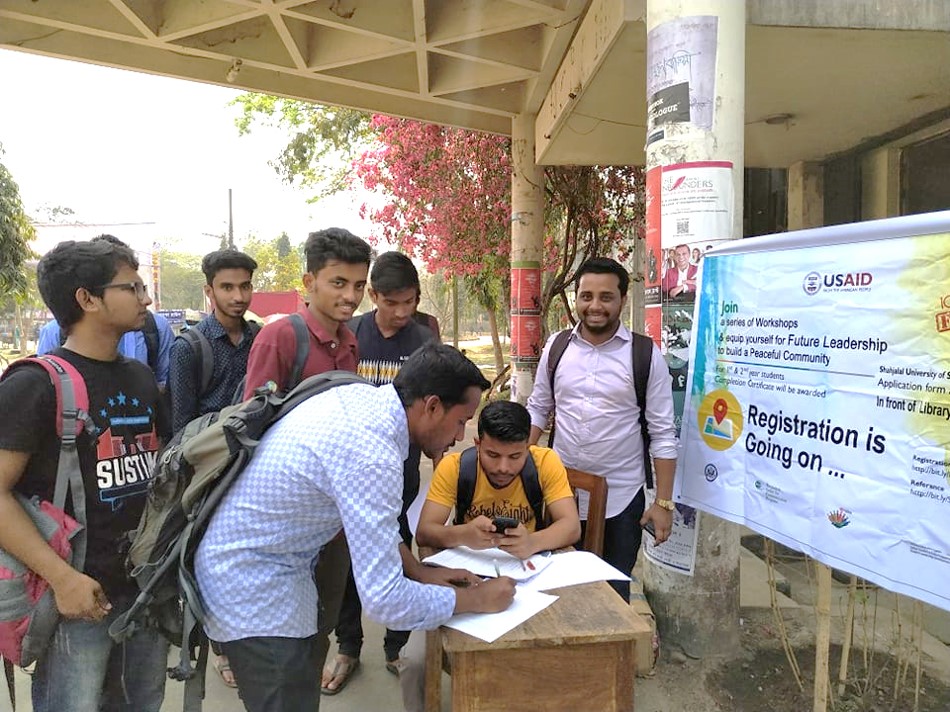
BCCP (Bangladesh Center for Communication Programs) has undertaken the Sylhet Student & Police Engagement-Student Leadership Development Workshops project to be implemented in Sylhet with local CSO partner Institute of Development Affairs (IDEA) and Sylhet Metropolitan Police (SMP) supported by USAID’s Obirodh: Road to Tolerance Program. The program will entail 6 workshops each in three selected universities/college in Sylhet and other relevant activities.
The selected educational institutions are: Shahjalal Science and Technology University, Metropolitan University and M.C College. Participants will include both students from the selected institutions and nominated Police members from Sylhet metropolitan Police (SMP).
The need for such an intervention has stemmed from the necessity to develop a mutually respectful partnership between police and the communities they serve to identify and address the root causes of instability and violence in our society. It is a known fact that social change is driven by the youth of a country. An effective way of preventing negative ideologies among the youth is for young people/students to learn to work with the police to promote a peaceful society.
Utilizing its experience in conducting the “Student & Police Engagement- Student Leadership Development Workshops in Chittagong and Rajshahi” and “Bangladesh Private University Student Leadership Development Program in Dhaka” BCCP is designing the workshops to enhance the leadership capacity of the students and the police-student relationship by employing effective means with the help of expert educators. The program intends young students to promote tolerance by increasing knowledge about the contemporary social issues and community resiliency, leadership; patriotism, international relationship and interfaith dialogue, communication skills, interpersonal skills, Critical thinking & decision-making skills, networking skills, etc. The proposed intervention will comprise of a number of activities:

The program will take place within the time span of 1st January to 31st December, 2019. The first three months of this program has been very eventful. Baseline Survey was conducted based on how the police and general people can be enhanced. The Survey was conducted by Innovative Research and Consultancy Services under the supervision of BCCP. Along with that, 3 sectoral meetings were conducted with the three selected institutions. A Project Advisory Committee was established which would be common for all three institutions as representatives from all 3 institutions are present in the committee. A total of 4 FGDs have been conducted-3 with student participants and 1 with nominated SMP police participants. Within these three months, 50 deserving student participants have also been selected who will take part in the workshops accordingly. The selection was based on the selection criteria and only those who were promising and matched with the requirements of the criteria were selected.
The workshops will take place by the end of June in full force and for that vigorous preparatory tasks are being conducted by the SLDW team.
Tobacco Control Policy Research Grant Program 2019
With support from an expert review panel, BCCP has preliminarily selected 9 proposals to provide fund under Tobacco Control Policy Research Grant Program 2019. Among the proposals, five were selected from ‘Student’ category while four were selected from ‘Researcher’ category. The review panel followed a-three step review process- 1) Screened all the proposals received and prepared a short for technical review; 2) Completed technical review; and 3) Evaluated the proposal defending by the applicants. A Proposal Review and Finalization Workshop will be held at the beginning of April 2019. It is expected that contract agreement will be singed with the grantees in May 2019.
Behavior Change Communication (BCC) materials on NCD risk factors and Healthy life style
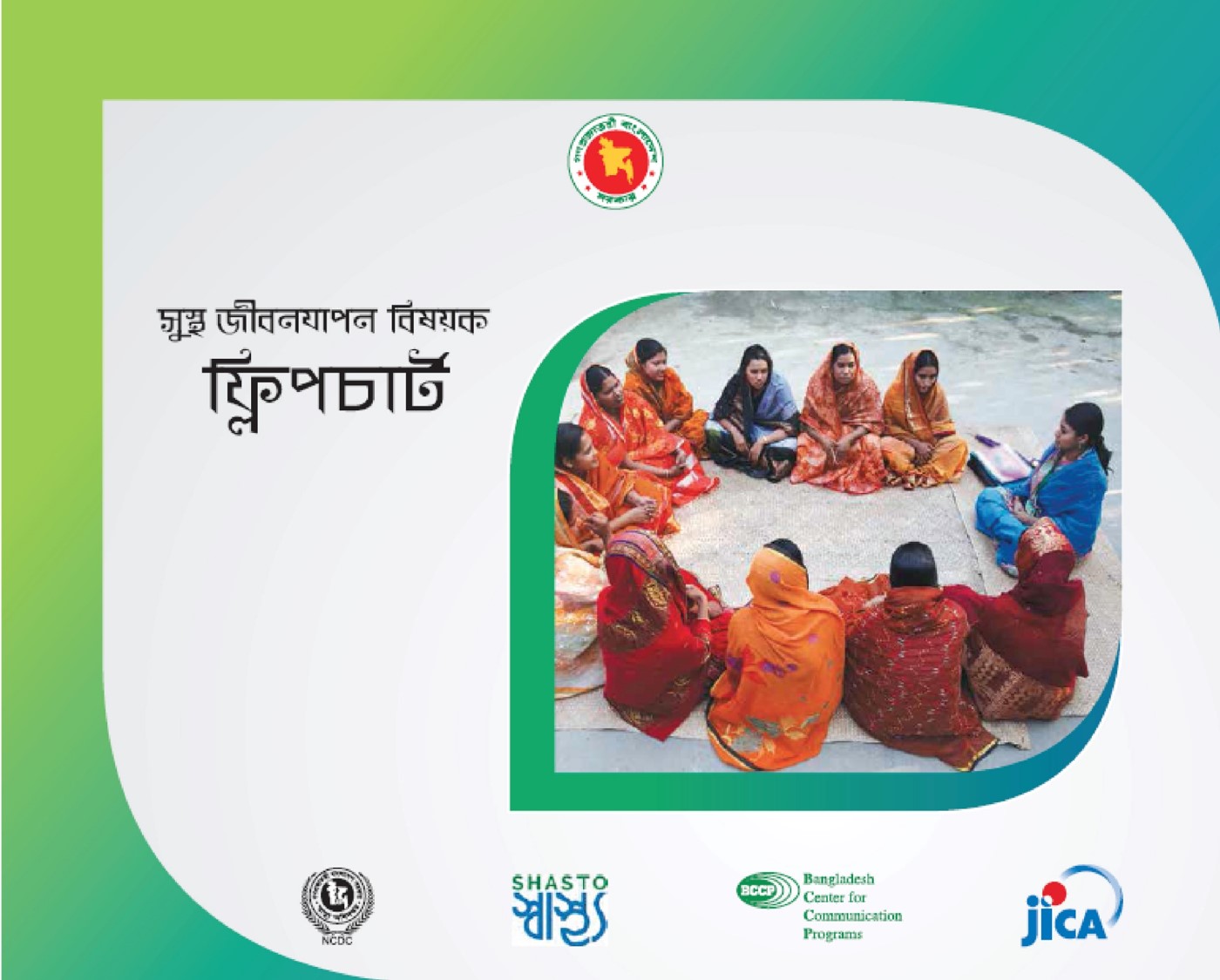
In March 2019, Bangladesh Center for Communication Programs (BCCP) has developed a set of Behavior Change Communication (BCC) materials on NCD risk factors and Healthy life style for JICA Bangladesh -SHASTO project through conceptualization, designing pretesting and a validation workshop. The materials are: Flipchart (Bangla), user manual (English and Bangla) and pictorial card on diabetes and hypertension. Objective of developing BCC materials were to aware the community people especially rural inhabitants to understand the risk of having non-communicable diseases and how to mitigate those risk by adopting healthy life style.

The developed BCC materials consist of important information regarding how to prevent risk of having non-communicable diseases which includes information (Balanced healthy food, Body weight control, be Physically active and avoiding Tobacco and Alcohol) by adopting healthy lifestyles. Proper utilization of materials by community health worker and distributing of pictorial card and adopting healthy lifestyle will mitigate risk of having non-communicable diseases especially Hypertension and Diabetes.
24th Advances in Strategic Communication Workshop Held
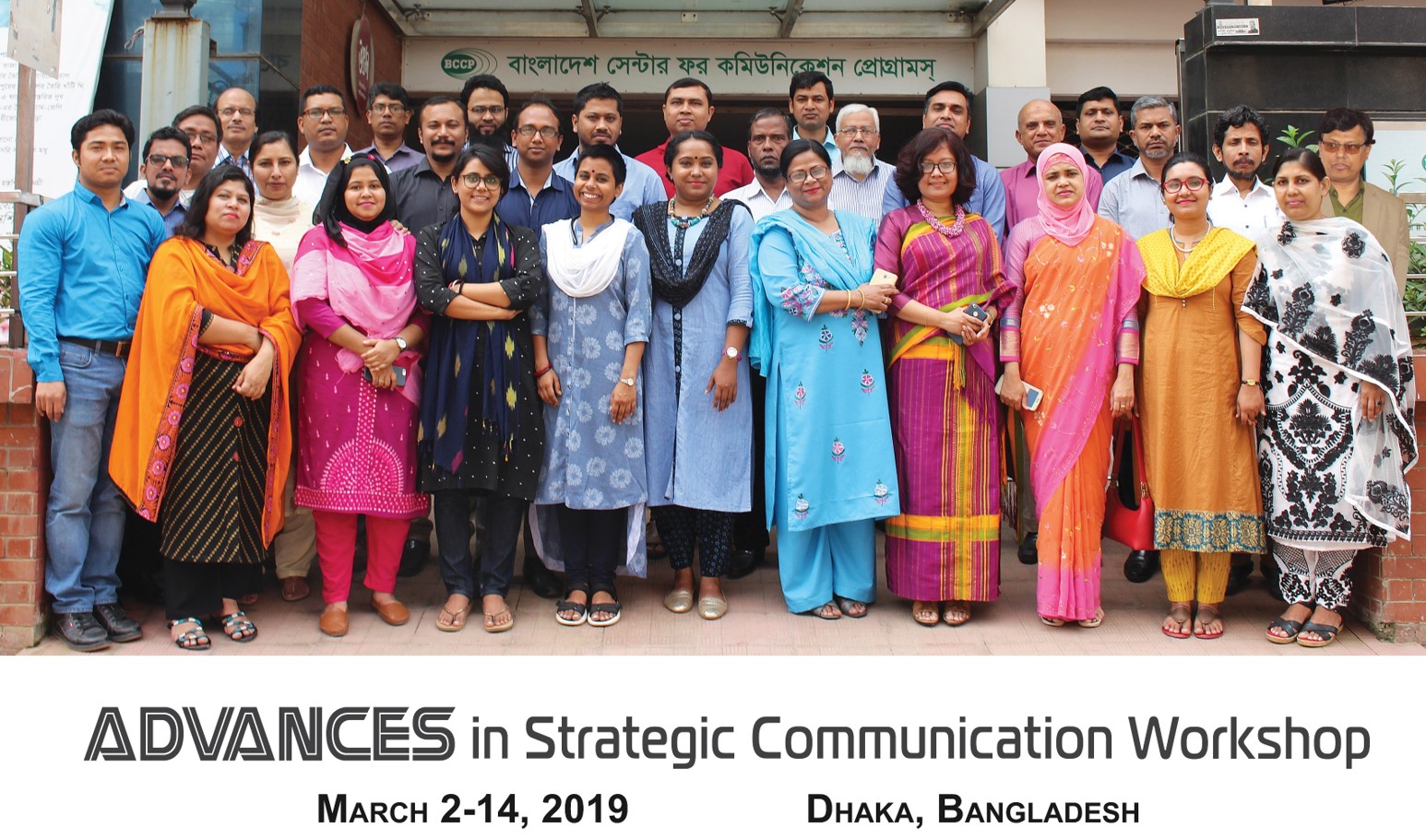
BCCP’s 24th Advances in Strategic Communication Workshop was held from 02 March to 14 March 2019. Twenty two communication professionals from different Government Directorates, NGOs and private organizations participated in this two-week long workshop.
BCCP organizes this workshop every year to promote more effective and state-of-the-art communication programs via enhancing the capacity of the program planners, designers, and implementers. The workshop is designed for senior to mid-level program managers and concerned professionals.
The workshop is modeled after the annual Leadership in Strategic Health Communication Workshop, which is conducted by the Johns Hopkins Center for Communication Programs (CCP), Baltimore, USA. It explores the essential elements of successful communication in the context of social development programs. The workshop has proven critically important in making a positive change in the communication behavior of professionals concerned with implementation, management, and supervision of BCC activities. Advances workshop is an exclusive opportunity for professionals in Bangladesh to receive comprehensive training on SBCC.
The highly participatory approach of the workshop helps participants to develop effective advocacy, social mobilization, and program communication strategies while strengthening their ability to implement dynamic communication programs.